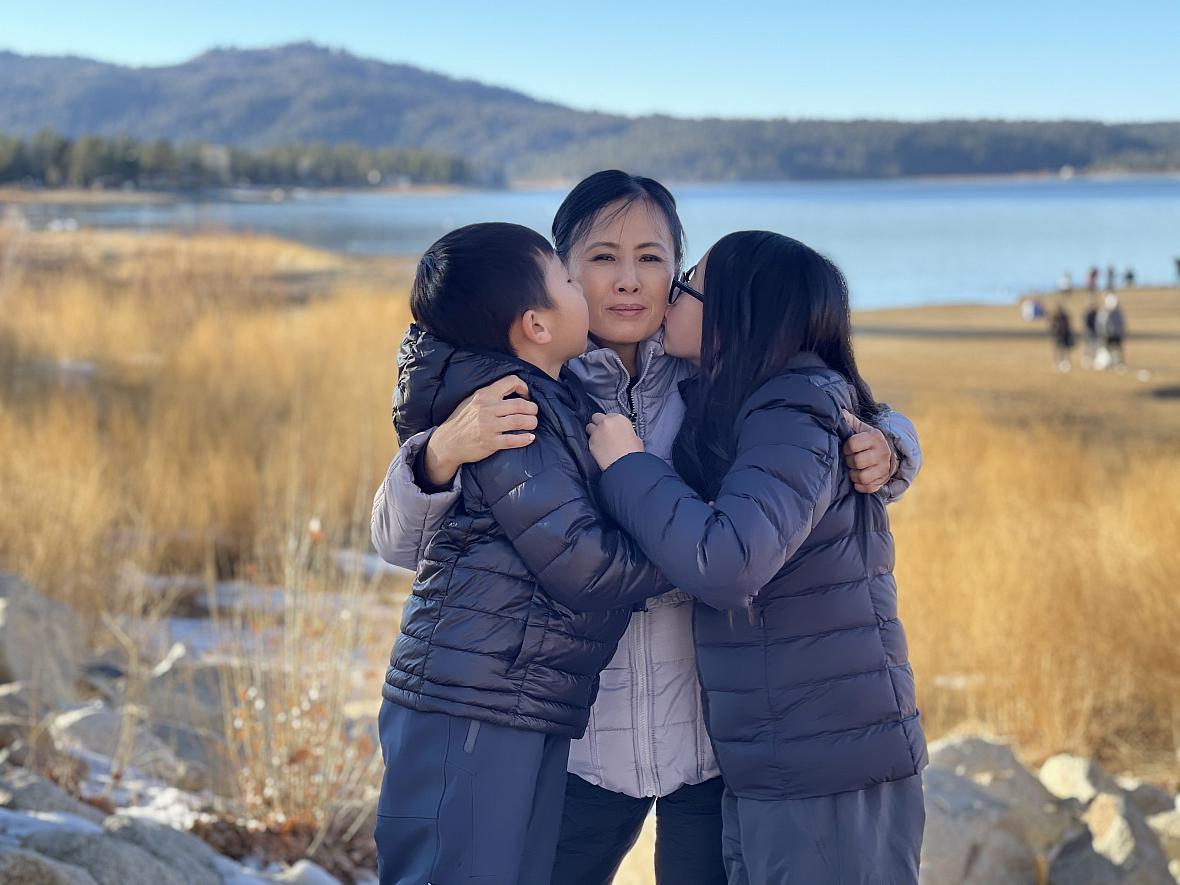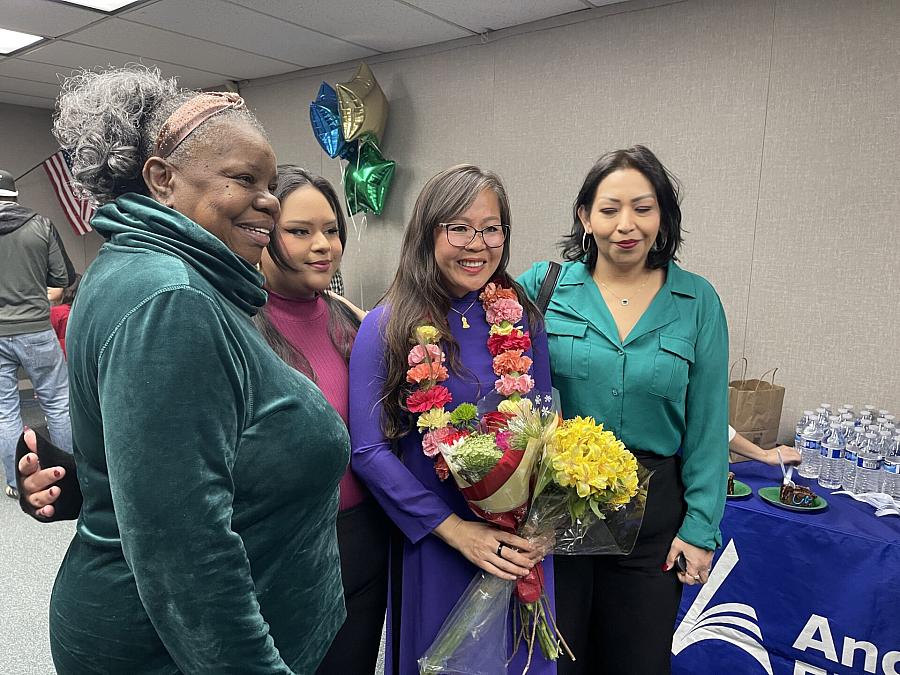Living with Autism in the Vietnamese American Community
The story was co-published with Nguoi Viet Daily News as part of the 2025 Ethnic Media Collaborative, Healing California.

Chinh Nguyen (center) and her children. (Photo by: Chinh Nguyen)
Nine years ago, Chinh Nguyen, an Orange County resident, began to notice something different about her two-year-old son, Patrick.
"During the first eight months after birth, Patrick rarely smiled or cried," she recalled. "He didn’t make eye contact when people talked to him or reacted when his name was called."
At first, she thought this emotional detachment meant she was lucky to have a calm child.
But as time passed, the truth became harder to ignore. A relative on her husband's side warned her that Patrick’s behavior resembled that of her own grandchild, who, at seven years old, still wore diapers and depended on family for all basic activities. She cautioned that Patrick might have a similar disability.
"I was devastated," Chinh said. "I could not sleep and spent hours reading about autism. What hit me hardest was that autism isn’t curable—only treatable. It would be something my child lives with for life."
Friends and even doctors told her not to worry, attributing the behavior to delayed development. Some warned against an early diagnosis, saying it could place Patrick into special education and lead to long-term stigmatization. Others urged her to keep his condition hidden to avoid bullying or social judgment.
Chinh, who was born in Vietnam, understood where the silence came from. "In our culture, families with children who are 'different' often hide it, fearing gossip or judgment."
Autism Spectrum Disorder (ASD) is a complex neurodevelopmental condition characterized by difficulties in communication, social interaction, and repetitive or restrictive behaviors.
Cultural perceptions and stigma
In Vietnamese culture, developmental differences are often viewed through spiritual and cultural lenses—fate, karma, or family shame. Rooted in Buddhist and Confucian values, these beliefs can discourage families from seeking help, fearing social rejection or loss of family honor.
Public acknowledgment of a disability can feel like exposing a family failure. As a result, many parents delay or avoid diagnosis, hoping the child will “grow out of it.” These cultural norms may reinforce silence, self-blame, and missed opportunities for early intervention.
Yet, it’s important to note the community is not monolithic. Attitudes are changing—especially among younger generations and families living in diaspora. Many are advocating for their children and demanding culturally competent services.
According to the CDC (Centers for Disease Control and Prevention), 1 in 31 children in the U.S. is now diagnosed with autism by age 8, a dramatic increase over the past decade. In California, the rate is even higher, with approximately 4.5% of 8-year-olds diagnosed, the highest among monitored states.
However, public health data often aggregates all Asian subgroups, masking disparities within ethnic communities. This lack of disaggregated data makes it difficult to assess the true needs of Vietnamese Americans, especially in areas like Orange County’s Little Saigon—the largest Vietnamese enclave outside Vietnam.
Rumor surrounds Autism
Amid heightened public discourse around autism—spurred in part by alarmist claims from Robert F. Kennedy Jr., the Secretary of Health and Human Services, and a recent report from the CDC’s Autism and Developmental Disabilities Monitoring Network—misinformation continues to circulate widely in many immigrant communities.
Secretary Kennedy Jr. recently called autism a rapidly growing "epidemic" in the U.S., citing a CDC report showing an increase in autism rates from 1 in 36 children in 2020 to 1 in 31 in 2022. He pledged to investigate and identify the "environmental toxin" he believes is responsible.
Also, he has long promoted the idea that vaccine ingredients, particularly thimerosal, are linked to ASD, a stance he elaborated on in his 2014 book and continues to push as Secretary, according to the Politico’s article.
Extensive scientific research has found no link between vaccines and autism spectrum disorder. Major studies, including those by the CDC and the National Academy of Medicine, have consistently shown that neither vaccines nor any vaccine ingredients, including thimerosal (a mercury-based preservative), cause autism.
A 2013 CDC study confirmed that the total number of antigens children receive in vaccines during their first two years of life does not differ between children with and without ASD. Similarly, a 2004 CDC study found no association between the MMR (measles, mumps, rubella) vaccine and autism, even when analyzed across racial and age groups.
Early signs and community advocacy
Vietnamese parents raising children with autism spectrum disorder often face significant challenges owned in part to social stigma, and limited access to appropriate services and resources.

Julie Diep (second from the right) at her swearing-in ceremony as Trustee of the Anaheim Elementary School District in December 2024. (Photo by: Dzung Do/Nguoi Viet)
Julie Diep, founder of OC Autism Foundation, a speech-language pathologist, and an autism advocate, has worked for over a decade to support families affected by autism.
“OC means Our Community,” she explains. Her organization helps Vietnamese families access basic healthcare, education, and lifelong services. Julie herself is autistic—as are her husband and two children.
“If your first child has autism, the second has a 20% to 40% chance of also having it,” she said. "One early indicator is lack of eye contact. If your child doesn’t track you with their eyes or respond when lifted, it’s important to get screened."
According to Dr. Suzanne Goh, a pediatric neurologist, behavior analyst, and neuroscience researcher, as reported in Autism Parenting Magazine, common signs of autism in infants and toddlers include:
Sensory sensitivities—such as strong reactions to sounds, tastes, textures, or other stimuli; reduced attention and limited interaction with others; delayed development of language, gestures, or imitation skills; differences in the quality of motor milestones like rolling, sitting, crawling, scooting, and hand use; and atypical motor patterns, including repetitive behaviors such as hand-flapping, toe-walking, spinning, and lining up toys.
Julie also shares the emotional toll of being autistic in a system that is often unkind.
“I was bullied. In our culture, we stay quiet because that’s how we survive,” she said.
She’s experienced suicidal thoughts due to social isolation and lack of support. When she sought therapy, the first response was often a discussion of payment.
"This is systemic abuse," she said.
She now serves as a trustee of the Anaheim Elementary School District to bring more resources to families. “If even I can’t access services, how can others who don’t know the system do it?”
She also encourages parents to look into In-Home Supportive Services (IHSS), a program that pays family caregivers up to $6,000–$7,000/month to care for children with disabilities at home.
Healthcare coverage
In Orange County, CA, families of children with autism typically rely on two main insurance streams: Medi‑Cal (California’s Medicaid) and private or employer-sponsored plans (often purchased via Covered California or employer).
According to The California Department of Health Care Services (DHCS), Medi-Cal provides full coverage for medically necessary Behavioral Health Treatment (BHT) services for eligible children under 21, including those with autism or other conditions. While any healthcare provider can refer a child for evaluation, only a licensed physician or psychologist can determine medical necessity and recommend BHT services.
In Orange County, Medi‑Cal enrollees typically get BHT services via Cal‑Optima, with providers coordinated locally.
California Children’s Services (CCS) also offers support to families with income under $40,000 or those whose out-of-pocket medical expenses exceed 20% of income, according to Orange County Healthcare Agency.
In addition, California law (SB 946) and federal mandates require private plans to cover autism services, including ABA (Applied Behavior Analysis, an evidence-based therapy for individuals with ASD), for minors.
Breaking the silence and building support
Chinh Nguyen now serves on the Board of Directors for the Regional Center of Orange County (RCOC), a nonprofit contracted by the state to coordinate services for over 23,000 people with developmental disabilities.
“I’ve been judged and dismissed by others when they learned about my son,” she said. “But I believe there are three pillars that help kids like Patrick thrive: inclusive schools, accepting social environments, and a supportive home.”
Patrick, who was once nonverbal and could not eat solid foods, is now communicating and growing. “He has moderate to severe autism, but he’s improving. We’re so proud. It’s not easy, but we cannot give up.”
Autism in the Vietnamese American community remains under-acknowledged, not because it is rare, but because stigma, cultural perceptions, and structural barriers prevent early diagnosis and treatment. But families like Chinh Nguyen and advocates like Julie Diep are reshaping the narrative—challenging silence, creating resources, and demanding equity.
